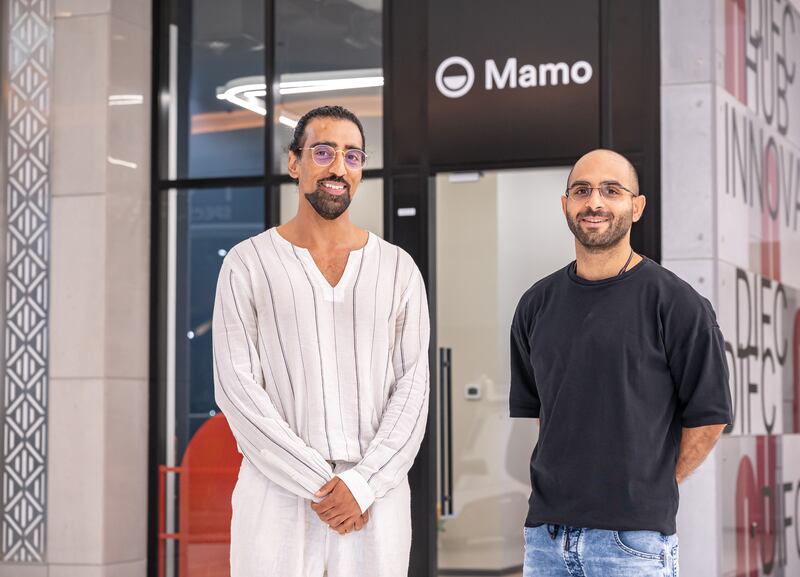When colleagues Asim Janjua and Imad Gharazeddine became flatmates after moving to Dubai in 2012, they had a tough time sorting their shared expenses.
The absence of a peer-to-peer app that would simplify fund transfers in a market that was only gradually embracing online payments became evident to the duo.
“We were divvying up our rents and our electricity bills and it was such a nightmare to send money through bank transfer. You have to log into a bank account [and provide an] IBAN number," says Mr Janjua, co-founder and chief experience officer of Mamo, a peer-to-peer payment app.
"So we were constantly finding ourselves complaining and whining [about the elaborate process].”
Digital payments transactions in the UAE were on the rise, growing at an annual rate of more than 9 per cent between 2014 and 2019, outpacing even Europe’s average annual growth of 4 per cent to 5 per cent, according to a report by McKinsey.
“At the time, players like Careem were disrupting the way you hail rides while Delivery Hero was disrupting the way you order food, it seemed only logical and natural the next space to be improved would be FinTech,” says Mr Gharazeddine, Mamo's co-founder and chief executive.
Having struck a camaraderie with each other at the Dubai office of Google – where they worked – the duo, along with another colleague, Mohammad El Saadi, launched Mamo in 2019 to simplify payments.
Like many other peer-to-peer payment apps, users can sign up digitally following a few simple steps. Once signed in, they can link either their cards or the bank account to initiate a fund transfer by choosing a name in their mobile contact list.
Recipients will get a message asking them to download the Mamo app to access the funds.
Mamo, which currently operates from the Dubai International Financial Centre, also offers a similar service for businesses, allowing them to send their customers payment links on demand.
The timing of Mamo app's launch, which began development in 2019 and materialised for use in 2021, was fortuitous.
Months into the launch, the world began to battle a pandemic. While it was hardly an ideal environment to start a company, Mamo founders soon noticed an uptick in online payments in a region that was highly reliant on cash use.
The digital payments market in the Middle East and North Africa began to boom as consumers increasingly preferred online payments over cash due to the health crisis.
More than three quarters of Middle East respondents polled in a survey by McKinsey estimate their use of digital payment modes has increased by about 10 per cent due to the Covid-19 pandemic.
“Back in 2019 … if you remember, Amazon was still doing cash on delivery. You can literally give the driver money,” says Mr Janjua.
But that has changed drastically following Covid-19. Digital payments remained the preferred mode for transactions, with consumers favouring contactless solutions such as debit or credit cards, digital wallets and mobile payments, according to a report by Visa last year.
“This is how far we have come in terms of credit card use in the region,” Mr Janjua adds.
The peer-to-peer payments space in the Middle East alone is expected to grow to $115 billion by 2023, from $22bn in 2019, Mamo estimates.
Currently, Mamo has seen more then 20,000 installations across both Android and iPhone to date. The FinTech has processed around roughly Dh3 million worth of peer-to-peer transactions since its launch, its founders say.
Its app for businesses processed more than Dh30m worth of transactions since its launch.
“We've enabled 50,000 plus customers to pay the businesses that are registered and on boarded. That figure is growing by roughly 100 per cent and it is doubling every quarter,” said Mr Gharazeddine.

Mamo does not charge consumers a fee for sending and receiving money but they will incur a slight charge if they use an international credit card or one that is not issued by a UAE bank to send money.
The company’s revenue largely comes from its app for businesses where a fee of between 2.6 per cent to 3.1 per cent is charged on every transaction processed.
Mr Gharazeddine declined to say how much revenue the company is earning but said the UAE is an ideal market for growth.
“The size in terms of revenue that we are potentially able to generate, based on the target market in the UAE, is around $3bn in revenue every year and that's coming from, you know, a 3 per cent share of $100bn total payments being processed by these SMEs that we plan to target in the UAE alone annually,” he says.
“Within the UAE we have around 250,000 small to medium sized businesses that we would like to acquire as customers of Mamo Pay for Business and that is a huge undertaking.”
However, prior to achieving those targets, founders are well aware of the regulatory milestones that need to be crossed before widespread use.
Currently, Mamo has just exited the first phase of DIFC regulator Dubai Financial Services Authority’s innovation testing licence that allows FinTechs to test their products in a controlled environment. The company is only allowed to activate 1,000 users in the first phase. It can increase this number to 3,000 and then 8,000 in the second and the third phase respectively, Mr Gharazeddine says.
Upon graduation from the third phase, there will be no restrictions on the number of users the FinTech can onboard.
“If you think about why this is the case, the regulator really wants to see we have the controls and systems in place to manage user funds effectively. So, they basically restrict the size of the market we're able to go after a while they work with us on validating all of that,” Mr Gharazeddine says.
Mamo has also raised two major founding rounds to fuel its growth. It raised $1.5m in a seed round in 2020 by Global Founders Capital, Global Ventures, VentureSouq, MSA Capital, Dubai Angel Investors, 500 Startups and some angel investors.
Last year, the FinTech raised $8m in a pre-Series A round led by UAE-based venture capital firm Global Ventures. New York venture capital firm 4DX Ventures, Saudi Arabia's AlRajhi Partners, Boston's Olive Tree Capital and investors from Silicon Valley also participated.
“The goal, since the last fundraise, was essentially to integrate all the compliance work we've done into our product and find ways on acquiring users efficiently,” says Mr Gharazeddine.
“We have a couple of milestones that we wish to hit by third quarter or fourth quarter of this year, at which point we will be ready to raise our Series A round right now has been like towards the end of the year.”
Mamo’s founders are also planning to expand beyond the UAE as they complete the testing phase with the DIFC.
“Our vision is basically to become Mena wide. We want to be present in all markets here,” says Mr Gharazeddine.
The next market that Mamo plans to focus on will be Saudi Arabia, where it aims to launch in 2023. The GCC and then Pakistan and Turkey will be the other markets on its radar, the founders say.
Q&A with Imad Gharazeddine and Asim Janjua, the founders of Mamo
What new skills have you learned while launching your start-up?
Imad: The biggest learning for me is that not everyone operates the same way. I often found that in the early stages, and it was very frustrating, like why people will do things one way when the correct way is your way, right? So that's a huge lesson for me. Whenever you see something, first of all ... relax, and then think to yourself, is that the wrong way? Or is it just another way that may or may not work? That allows you to think that maybe I should step back from things, trust the team or not micromanage? That ends up doing wonders for team morale.
Running a team is not just about what you can contribute and how you expect people to work, but it's about how do you get the best out of people, given that they, by definition, work in different ways. How do you build a team that is cohesive, despite the differences, not try to make everyone behave in a certain similar way.
Asim: We talk a lot about agility and adaptability. But you truly do not understand that until you become a founder, the ability to wear multiple hats, stay calm, compassionate, considerate, good tempered under pressure goes an incredibly long way. And there's no better training for that than being part of a start-up. You're pulling in a number of different directions and if you don't have that sensibility of being adaptable and malleable to do this, it can get really, really difficult.
Learning the business acumen part of a start-up was really important. I have learned so much on how to navigate that space, how to speak and conduct ourselves inside meetings with banks and partners, etc.
If you could start over what would you do differently?
Imad: One thing I would do differently is be more daring and take more risks, as in launch faster, ask for forgiveness rather than permission more often than not, and basically get more help and mentorship and advice from folks who have been there and done that, so that you can avoid certain mistakes or wasted time on things, by learning from everyone else's lessons.
Asim: Perhaps if I was to do my it all over again, maybe building a FinTech that was not incumbent on regulation, so that we can kind of get to market much quicker. That said, and in retrospect, regulation is going to provide us long term with exponential growth.
What other successful start-up you wish you had started?
Imad: For me, this is an easy one. So something along the lines of Robinhood or hedge fund Renaissance Technologies.
Asim: I think I would be involved with something to do with cryptocurrencies or blockchain if not with Mamo.







